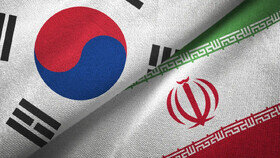Iran South Korea to collaborate on renewable energy development
Iran, South Korea to collaborate on renewable energy development
TEHRAN – A professor at Seoul National University has proposed a pilot project and the formation of a joint working group involving government entities, universities, research centers, and industrial companies from Iran and South Korea to establish long-term collaboration in renewable energy development.

In a message to the 14th International Renewable Energy and Electricity Efficiency Exhibition in Iran, Professor Hwang highlighted the state of the electricity industries in both countries and outlined potential areas for cooperation in transitioning to cleaner energy, ISNA reported.
Professor Hwang emphasized the integration of smart electricity grids, the expansion of renewable energy, and the decarbonization of the economy. He noted that South Korea's installed electricity generation capacity is currently around 149 gigawatts, with 38 gigawatts supplied by distributed energy sources, including renewables, and the remainder coming from nuclear (26 GW) and thermal power plants (85 GW). Thanks to advancements in its electricity sector, the country has reduced the average annual outage per consumer to approximately eight minutes and limited transmission and distribution losses to 3.5 percent.
The professor also referenced South Korea's experience with smart grid projects, underscoring the coordination between renewable energy plants, smart meters, electric vehicle charging stations, and energy storage systems within the grid.
South Korea aims to reduce carbon emissions by 40 percent by 2030 and achieve full carbon neutrality by 2050. To date, the country has installed nearly 25 gigawatts of solar power plants, 10 gigawatt-hours of battery storage capacity, and approximately 600,000 electric vehicle charging points. However, meeting its 2050 targets of 508 gigawatts of clean energy generation and 20 million electric vehicles on the roads will require a fully digital and intelligent power grid.
Professor Hwang noted that Iran derives nearly 90 percent of its energy from fossil fuels. Achieving its target of 30 gigawatts of renewable energy capacity by 2030 will necessitate a comprehensive plan, including smart grid development, significant financial investment, workforce capacity building, and the creation of new business models. He suggested that advanced technologies such as artificial intelligence and big data analytics could play a vital role in household, industrial, and grid automation sectors.
In conclusion, he reiterated the importance of initiating a pilot project and forming a joint task force with a clear timeline to foster sustained collaboration between the two nations in renewable energy and smart grid advancements.
EF/MA
source: tehrantimes.com